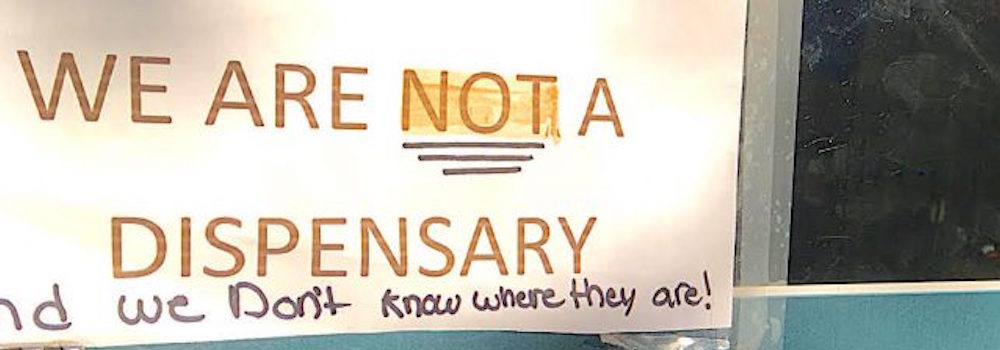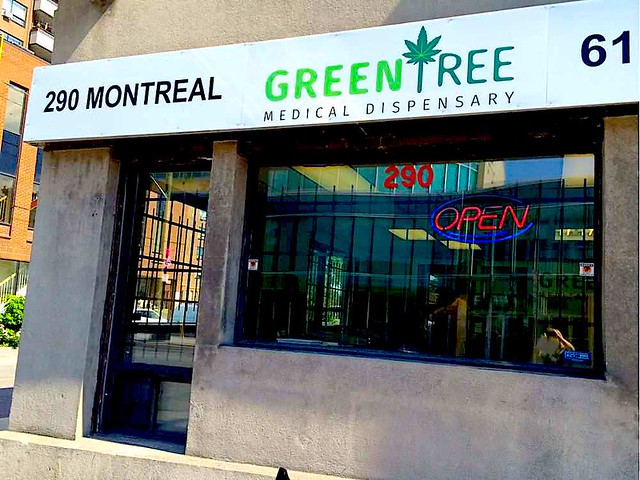More than once, Kristina Simpson has had to deny her customers the cookies, candy, soda, and other treats sold at the store she manages on Bank Street.
That’s because Weeds Glass and Gifts, unlike the Golden Baguette bakery down the street, sells edible products laced with medical marijuana. Weeds is one of several store-front dispensaries that have popped up in Ottawa since the April 20 announcement of the Liberal party’s intention to legalize marijuana. But even amidst shifting laws, many of these new “medical dispensaries” are still illegal.
But Simpson is convinced that she is doing the right thing by offering patients easier access to the medicinal herb.
“This is something that we all believe in here, and we all do know the consequences,” she says.
It is therefore at significant personal risk that Simpson, like other dispensary employees in the city, operates her shop. She says she feels that what she does is important enough to risk the potential fallout of operating in a legal grey zone, especially in a time when the police response to dispensaries can be hard to predict.
![Kristina Simpson, manager of Weeds Glass and Gifts on Bank Street, Ottawa [Photo Amber-Dawn Davison].](http://cusjc.ca/drift/wp-content/uploads/2016/11/kristina-and-weeds.jpeg)
“I’m not not concerned,” Simpson says with a laugh. “Of course it’s always a concern, but I mean, my beliefs override that.”
Indeed, less than a week after police raids on seven Ottawa dispensaries lead to the arrest of nine employees, the possible consequences are tangible. But legal issues are not the only concern for “pot shop” workers. According to Ottawa police, six marijuana dispensaries in Ottawa have been robbed, several at gunpoint, in the few short months since marijuana shops, which previously had been hidden on back streets, starting springing up as store fronts.
Shops that comply with Health Canada’s Access to Cannabis for Medicinal Purposes Regulations (ACMPR), like Weeds, say they are confident that they will not fall victim to robbery, or police interference, simply because they haven’t yet.
A constable with the Ottawa police who prefers to remain unnamed confirms this reality, saying she believes that other shops have experienced crime and intervention by making themselves easy targets, partly because they tend not to take the precautions they should.
“When you think of an LCBO in comparison, they have video cameras, multiple staff working, and things in the store are strategically placed,” she explains. “You look at some of these sketchier dispensaries, and you see they have no security guards, no alarms, and some don’t even have video surveillance. That gives better odds than robbing a gas station.”
Simpson, whose store has an installed security system with surveillance and a direct line to the police, says that some dispensaries are targeted for robbery because of the clientele they serve. ACMPR-compliant shops like Weeds tend to have better security and attract more mature, well-behaved customers, Simpson says. But some dispensaries are less stringent, and cater to younger demographics sporting “one-time ‘scripts” and looking for recreational drugs.
According to the constable, the clientele is a huge factor in both the potential for robbery, and the likelihood of police intervention.
“We receive complaints, and more complaints means more obligation to follow up,” she says.
She compares the situation to two hypothetical bars, both operating without proper licenses. If one bar is and constantly receiving complaints while the other isn’t, there is a greater likelihood that the first bar will be investigated and shut down, even if both are technically breaking the law.
But the “shady clientele,” as she puts it, are an issue for more than just the dispensaries. Employees in the pipe and bong shop across the street from Weeds say they are sick of young people coming into the shop, which does not sell marijuana, thinking it is a dispensary.
“We don’t sell weed. As if we would mess up our lucrative business by dipping into illegal drug sales.”
The disturbances to their shop have been so continuous that the manager has put up a sign reading, “We are NOT a dispensary. And we don’t know where they are!”
![Sign outside Cannabis Emporium, a head shop across the street from Weeds. [Photo Amber-Dawn Davison].](http://cusjc.ca/drift/wp-content/uploads/2016/11/cannabis-emporum-sign-2.jpeg)
“We put up the sign because we got tired of repeating ourselves,” says one employee. “We don’t sell weed. As if we would mess up our lucrative business by dipping into illegal drug sales. All of our merchandise put together is worth at least a quarter of a million dollars… none of us are going to mess that up by selling two grams of weed for the price of our lunch.”
With the Liberal government’s intention to legalize marijuana, the issue of legality may soon be taken out of the equation. In that context, Simpson and the constable share a vision for the relationship between the authorities and marijuana dispensaries: They would like to see well-regulated, responsible shops treated the same way as any establishment serving alcohol.
The unofficial position of many police officers is that if they are properly run and have their documentation in order, ACMPR-compliant dispensaries are not much different than an LCBO store, and marijuana is not much different from alcohol.
With the expected upcoming legalization, fines and restrictions similar to those governing alcohol use, such as penalties for using in public and possession of large amounts, might exist in the future.
Simpson says authorities need to become involved, to regulate not only the product, but the spaces used to sell them.
“They need to regulate it so there can be safety protocols and people do feel comfortable coming into these spaces,” she says. “The more regulations that are put in place, the more we can follow them.”


Leave a Reply